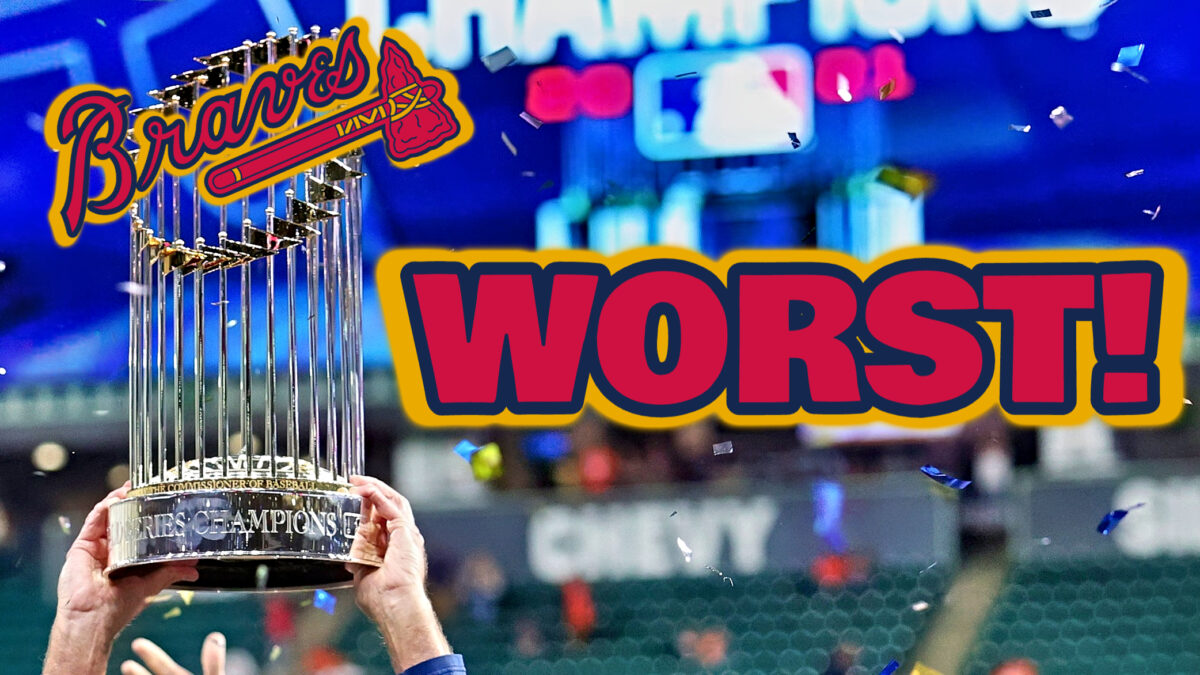
Everyone loves a great World Series, but when a horrible teams wins nobody is happy.. Let’s take a look at the 10 WORST Teams To Win The World Series.
2006 St. Louis Cardinals
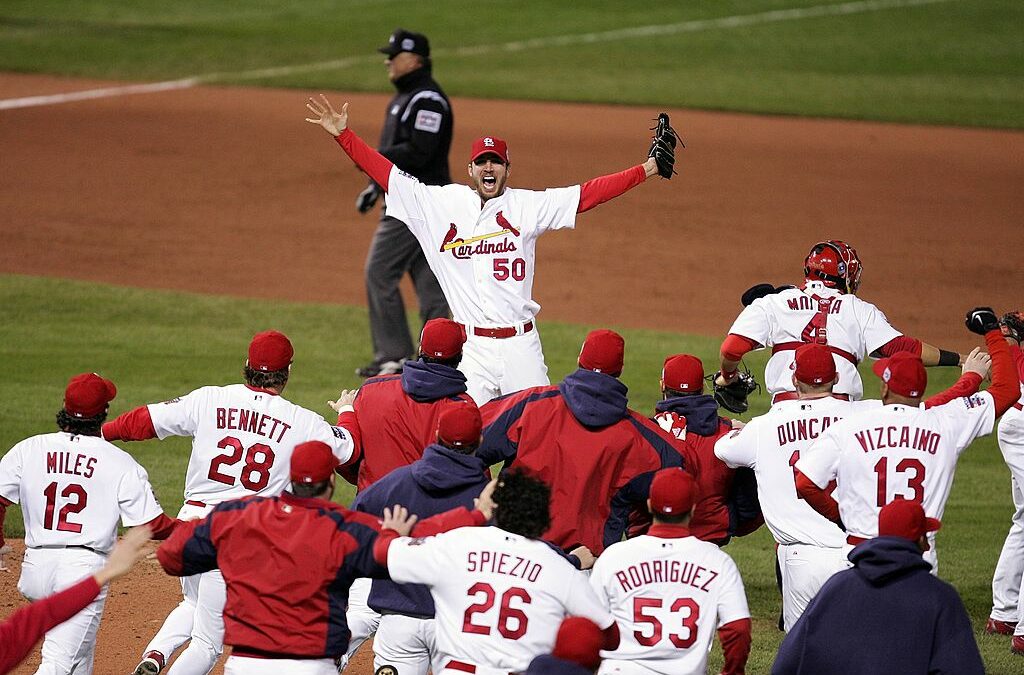
The fact that the 2006 Cardinals were the Cardinals team that won the World Series out of their 2004-06 core is nothing short of extraordinary. The Cardinals limped into the playoffs with an 83-78 record, easily the worst out of any team to win the championship, though the team had won 205 games across the past two seasons and largely had the same team.
Out of their four primary infield position players, three were All-Stars: Albert Pujols at first base (who likely would have won NL MVP if Ryan Howard hadn’t decided to push 60 home runs), David Eckstein at shortstop, and Scott Rolen at third base; in the outfield, they were led by Juan Encarnacion, So Taguchi, and an aging Jim Edmonds. The pitching rotation was led by the team’s fourth All-Star, Chris Carpenter, and he was backed up by Jeff Suppan, Jason Marquis, and Anthony Reyes; out of the bullpen, the Cardinals primarily relied on a rookie Adam Wainwright, Braden Looper, and their closer, Jason Isringhausen.
Entering the postseason as the 3-seed in the NL, the Cardinals first upset the 88-win San Diego Padres 3-1 in the NLDS before defeating the heavily favored New York Mets, who had 97 wins, in the NLCS to punch their ticket to the World Series. In the World Series, the Cardinals faced off against the heavily-favored Detroit Tigers, who, despite being the 4-seed in the AL, had 95 wins on the season; the Cardinals would defeat the Tigers in five games with World Series MVP going to Eckstein, who tallied three doubles, four RBI, and a .364 batting average in the five game series.
1987 Minnesota Twins
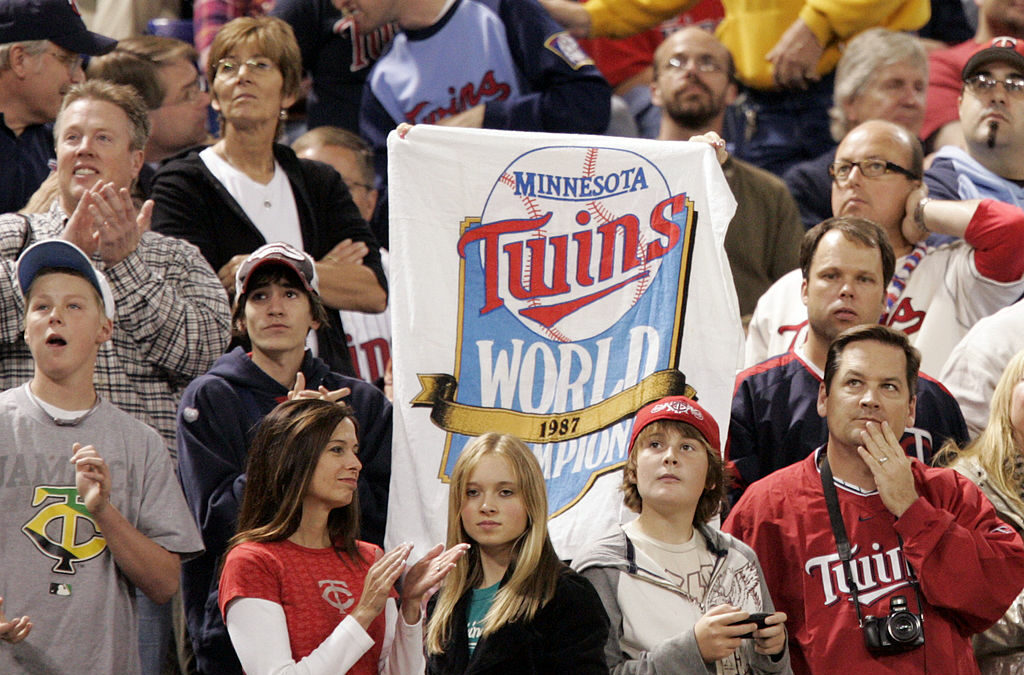
The Twins won an extremely weak AL West division in 1987 with a record of 85-77, in an era where only the two division winners in each league made the postseason. They were making their first postseason appearance since 1970, and the franchise hadn’t won a World Series since 1924, when they were still known as the Washington Senators.
Click on ‘Follow Us’ and get notified of the most viral MLB stories via Google! Follow Us
The team had one All-Star, Kirby Puckett, who was the star of the team and a future Hall of Famer, as well as two other Hall of Fame pitchers in Steve Carlton and Bert Blyleven (though Carlton was well past his prime). Outside of them, the team was led by players like starting pitcher Frank Viola, first baseman Kent Hrbek, shortstop Greg Gagne, and outfielder Tom Brunansky.
In the ALCS, the Twins were a heavy underdog against the Detroit Tigers, winners of 98 games and the East Division; the Twins’ record was so poor that they would have placed fifth in the AL East, behind the Tigers, Blue Jays, Brewers, and Yankees. The Twins would win the series in five games to advance to the World Series, where they would face the winners of the NL East, the 95-67 St. Louis Cardinals, who were led by Hall of Fame shortstop Ozzie Smith and two other All-Stars in Jack Clark and Willie McGee.
In the World Series, the home team would win every game, the first time this happened in the history of baseball. The Twins would come back from a 3-2 deficit after five games to win the World Series in seven games; Viola would win World Series MVP after pitching a complete game in Game 1 and eight innings in Game 7, only allowing three runs over his 17 innings.
2000 New York Yankees
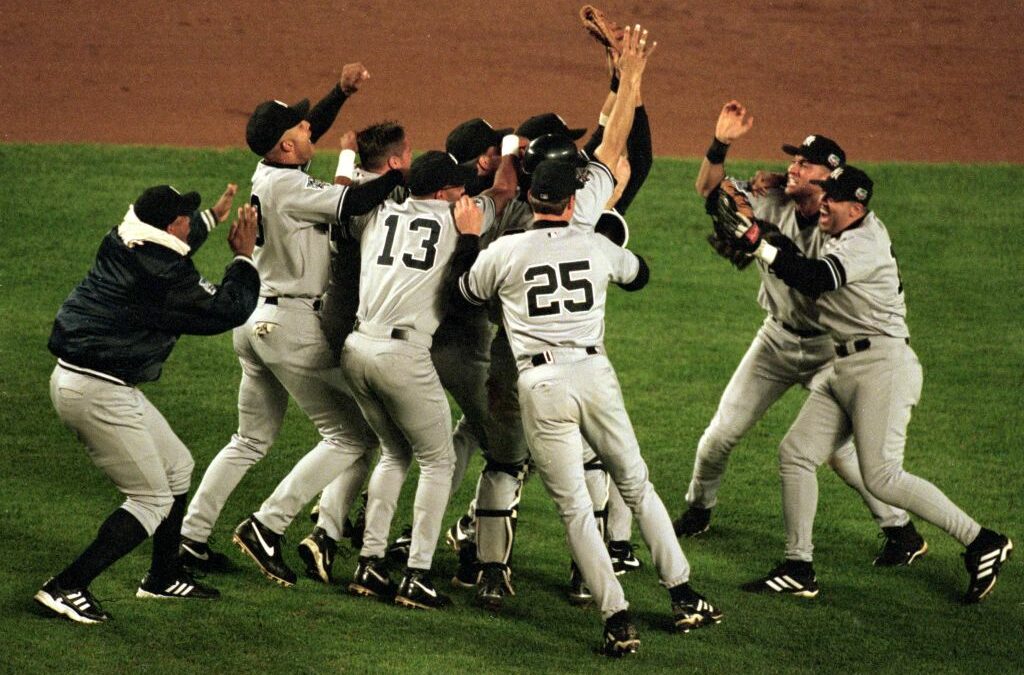
With an 87-74 record, the 2000 Yankees rank as the third worst team to win the World Series in terms of win percentage. The Yankees had won the World Series the past two seasons and three of the last four, though they would win 11 less games than the previous season and 27 less than 1998 with essentially the same roster.
The team was led by two Hall of Famers, closer Mariano Rivera and shortstop Derek Jeter, as well as a starting pitcher who undoubtedly would have made the Hall of Fame if he hadn’t used steroids (and who is known as one of the greatest pitchers ever), Roger Clemens. The team had four All-Stars: Jeter, Rivera, center fielder Bernie Williams, and catcher Jorge Posada, and had other major performers in starting pitcher Andy Pettite, right fielder Paul O’Neill, and reliever Jeff Nelson. However, several players dropped their production from what they had done in 1999; the most extreme example was David Cone, who went from throwing a perfect game and being a Cy Young Award candidate in 1999 to being below replacement level (based on WAR) in 2000.
In the ALDS, the Yankees faced off against the AL West champion Oakland Athletics, winners of 91 games, and won in five games, 3-2, before facing off against the Wild Card Seattle Mariners, who had also won 91 games, in the ALCS, where they would win in six games. In the World Series, the Yankees would face off against the New York Mets in a “Subway Series,” where the Yankees would win in five games to win their 26th World Series as a franchise; Derek Jeter would win World Series MVP after hitting two home runs, two doubles, a triple, and having a .409 batting average for the series.
2014 San Francisco Giants
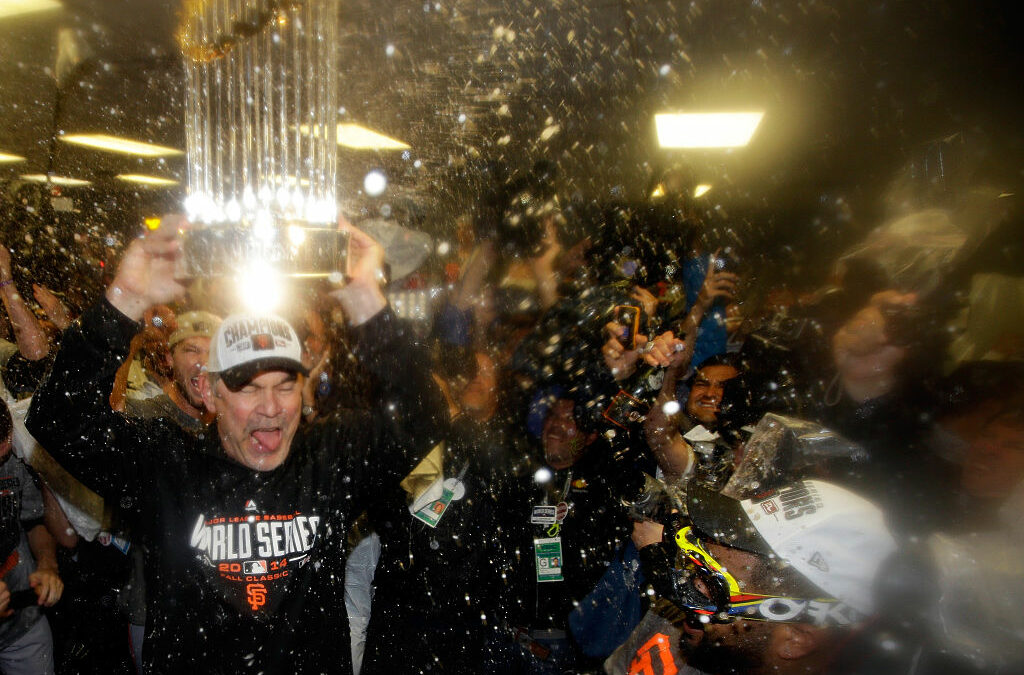
Like several of the teams after them on the list, the 2014 Giants are notable for the postseason heroics of one player: Madison Bumgarner. In six starts during the postseason, he threw two shutouts, including one in Game 5 of the World Series, and across his three games he pitched in the World Series, he allowed one run in 22 innings.
The team won 88 games, good enough to be the second Wild Card team in the NL, and they won the Wild Card Game against the Pittsburgh Pirates, 1-0, off of a shutout by Bumgarner; they would advance to face the 1-seed Washington Nationals, who had won 96 games in the regular season, and the Giants would win the series 3-1. In the NLCS, the Giants would face off against the winners of the NL Central, the St. Louis Cardinals; the Giants would win the series 4-1 to advance to the World Series against the Kansas City Royals, another Wild Card team.
In the only World Series in history to feature two Wild Card teams, the Giants would beat the Kansas City Royals in seven games, with the World Series MVP going to Bumgarner, who pitched eight innings and allowed one run in Game 1, pitched a complete game shutout in Game 5, and returned in Game 7 on two days rest to pitch five shutout innings and earn the longest save in World Series history.
The team certainly had some great players, with three All-Stars in Bumgarner, starting pitcher Tim Hudson, and right fielder Hunter Pence, a future Hall of Fame catcher in Buster Posey, Pablo Sandoval manning the hot corner at the peak of his powers, and Brandon Crawford at shortstop, but it was not nearly as good of a team as they had in 2010 or 2012, when they won their first two World Series in the 2010s.
2021 Atlanta Braves
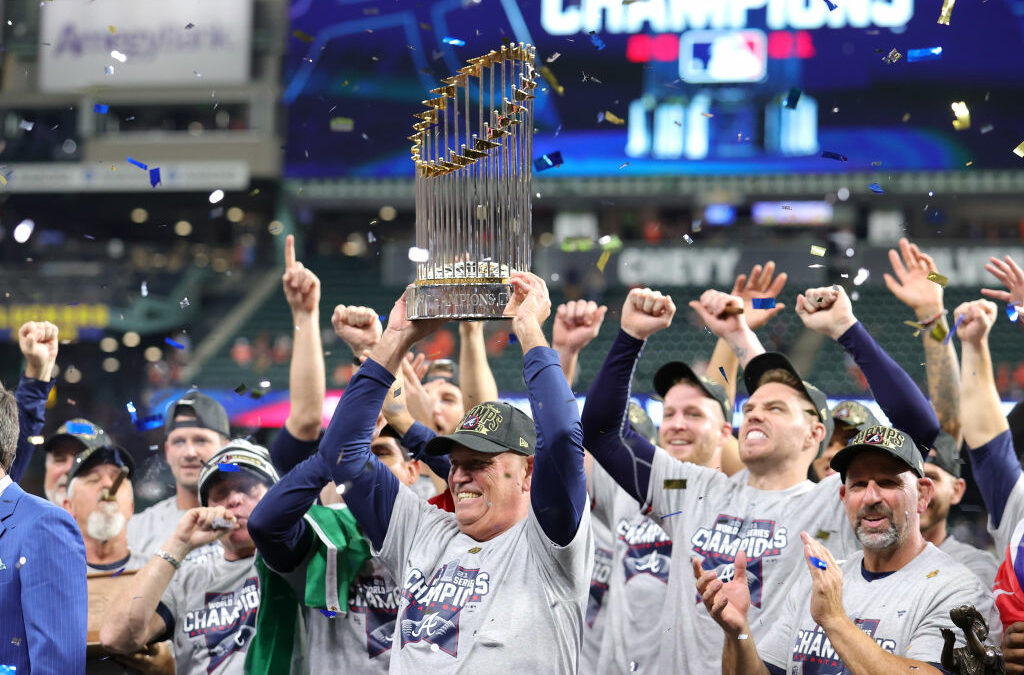
The 2021 Braves are looked back on as a great team, but out of all the contending teams the Braves have had since 2018, this team was probably the worst. By record, they most certainly are, with a record of 88-73 heading into the playoffs.
The Braves had three All-Stars in right fielder Ronald Acuña Jr. (who tore his ACL shortly after the All-Star break and was unavailable for the playoffs), first baseman Freddie Freeman, and second baseman Ozzie Albies. Outside of those three, the Braves had a solid roster with players like third baseman Austin Riley, shortstop Dansby Swanson, and starting pitchers Max Fried, aging Charlie Morton, and star rookie Ian Anderson.
In the NLDS, the Braves faced off against the Milwaukee Brewers, winners of 95 games, and defeated them handily in four games before facing the Wild Card winning Los Angeles Dodgers, who won 106 games (the San Francisco Giants, winners of the NL West, won 107 and were defeated by the Dodgers in the NLDS in five games); the Braves would defeat the Dodgers in six games to make their first World Series since 1999, when they were swept by the New York Yankees. In the World Series, the Braves faced the Houston Astros, who were the 2-seed in the AL after winning 95 games and the AL West, and won in six games, with World Series MVP going to Jorge Soler, who the Braves had traded for at the trade deadline from the Kansas City Royals to replace the injured Acuña, after hitting three home runs, including two in the pivotal Game 4, which the Braves left with a 3-1 lead.
2011 St. Louis Cardinals
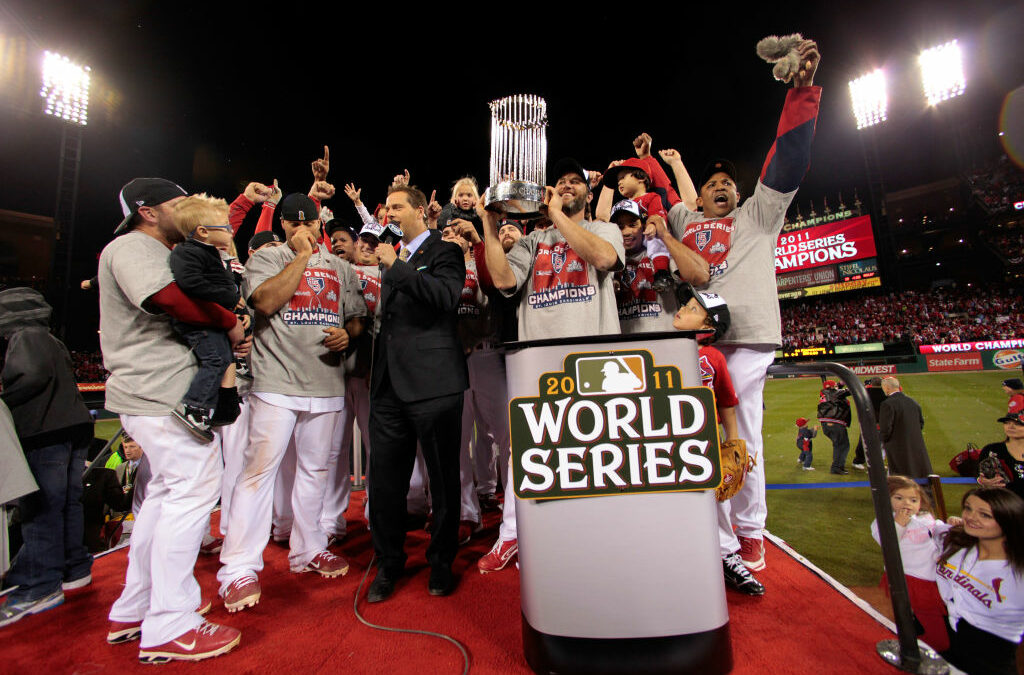
Like the 2014 Giants, the 2011 Cardinals are notable for the insane World Series performance of one player: David Freese. Freese had one of the greatest World Series performances by a single player in history, with three doubles, a triple, a home run, seven RBI, and a .348 batting average for the series. His best game came in what is arguably the best game ever for a single player during Game 6, where he hit a 2-run triple with two outs and two strikes in the bottom of the ninth inning to tie the game, and then hit a walk-off home run in the bottom of the eleventh inning to push the series to seven games.
The roster was solidly built, with three All-Stars in catcher Yadier Molina, left fielder Matt Holliday, and right fielder Lance Berkman; outside of those three there were a prime Albert Pujols manning first base, an aging but still good Chris Carpenter serving as the ace, and the relatively unknown Freese at third. The team won 90 games, which was good enough for the NL Wild Card, but they had the worst record out of any team that made the playoffs and were not expected to contend with the Phillies, Brewers, Yankees, or Rangers if they got that far.
In the NLDS, the Cardinals faced the Phillies, who had won 102 games and had the best record in the MLB, and won in five games to set up a matchup in the NLCS with the Milwaukee Brewers, who had won the NL Central and 96 games. The Cardinals would fairly easily defeat the Brewers in six games, with St. Louis winning the final two games in blowouts to advance to the World Series, where they would face the aforementioned Rangers, who had lost the World Series the previous year to the San Francisco Giants.
In the World Series, the Rangers took a 3-2 lead after five games, and were one strike away from winning the World Series two separate times in Game 6 before Freese decided to become a demigod. In Game 7, the Cardinals would pull away late to win the game 6-2 and the franchise’s 11th World Series.
1997 Florida Marlins
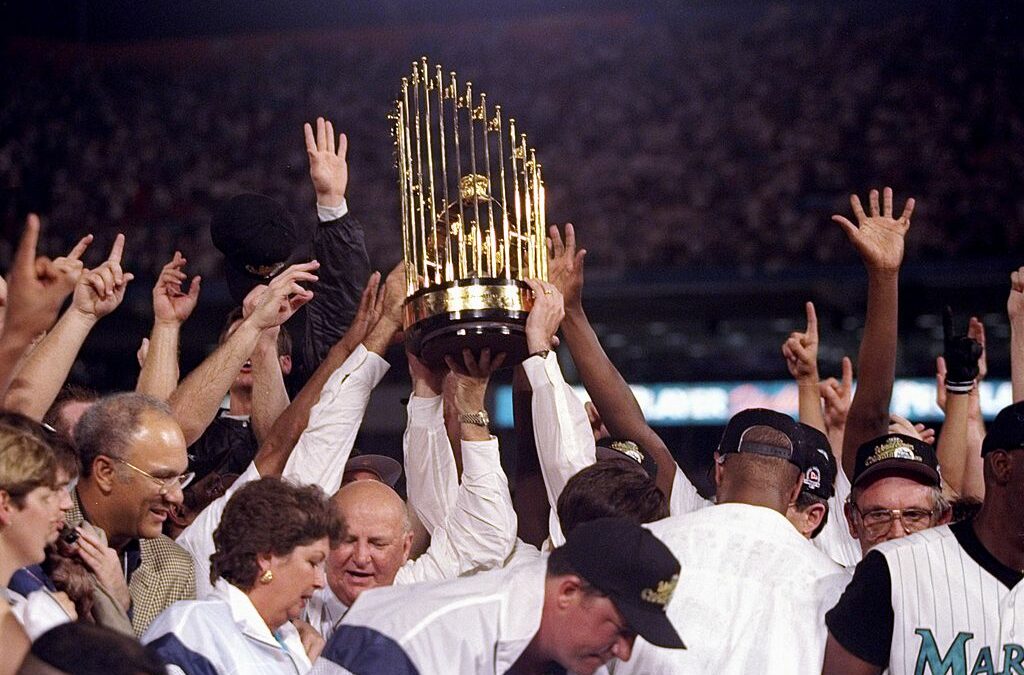
In the Marlins’ fifth year as a franchise, they broke through to make their first postseason appearance and win their first World Series in a seven game contest over the Cleveland Indians. They had never finished with a winning record before, though the year prior they did progress to a record of 80-82; in 1997, they would finish with a 92-70 record, good enough for the NL Wild Card spot after the Atlanta Braves won the NL East with a 101-61 record, which was also the best in the MLB.
In the NLDS, the Marlins would face the San Francisco Giants, winners of 90 games, and easily dispatched them with a three game sweep. The Marlins’ reward was a date in the NLCS with the Braves, who were led by their four-headed monster of a starting rotation, which consisted of Hall of Famers Greg Maddux, Tom Glavine, and John Smoltz, as well as All-Star and Cy Young Award candidate Denny Neagle, as well as two other Hall of Famers in Chipper Jones and Fred McGriff.
The Marlins upset the heavily-favored Braves in six games to advance to the World Series, where they would face the Cleveland Indians, who had won 86 games and won a weak AL Central; the Indians were playing in their second World Series in three years, having lost to the Atlanta Braves in six games in 1995. In the World Series, the Marlins prevailed in seven games, with the final going to 11 innings, to win their first championship as a franchise, with 22-year-old pitcher Liván Hernández winning World Series MVP after winning his two starts; the team was decent, but they had one of the easiest paths to the World Series any team has ever had.
2003 Florida Marlins
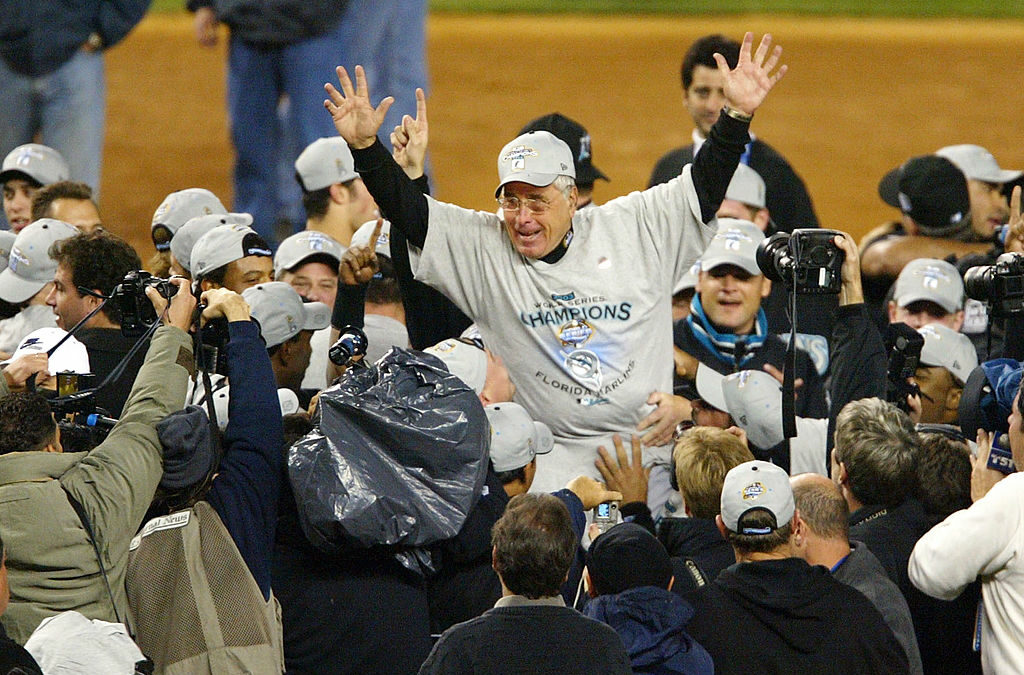
Six years later, the Marlins would repeat as champions after once again making the playoffs as the Wild Card. The team had three All-Stars in second baseman Luis Castillo, starting pitcher Dontrelle Willis, and shortstop Mike Lowell; Willis won NL Rookie of the Year, and a very young Miguel Cabrera finished fifth in Rookie of the Year voting after splitting time between third base and left field. The leader of the team, however, was Hall of Fame catcher Ivan “Pudge” Rodriguez.
The Marlins won 91 games, good enough for the Wild Card after the Atlanta Braves once again won the NL East with a 101-61 record; in the NLDS, Florida would face off against the San Francisco Giants, who had lost the World Series the previous year, and would win fairly easily in four games. In the NLCS, the Marlins would face the Chicago Cubs, who had upset the Braves in the NLDS and had won 88 games in the regular season, and would rally after being down 3-2 through five games and win the last two games of the series to make the World Series, where they would face the New York Yankees, who were making their ninth straight postseason appearance and had made the World Series for the seventh time in nine years.
In the World Series, the Marlins would prove to be too much for the Yankees’ dynasty to handle, as they won the final three games of the series to win 4-2. World Series MVP went to Josh Beckett, who threw a complete game shutout in Game 6 to clinch the series and only allowed two runs in seven innings of action in Game 3.
1960 Pittsburgh Pirates
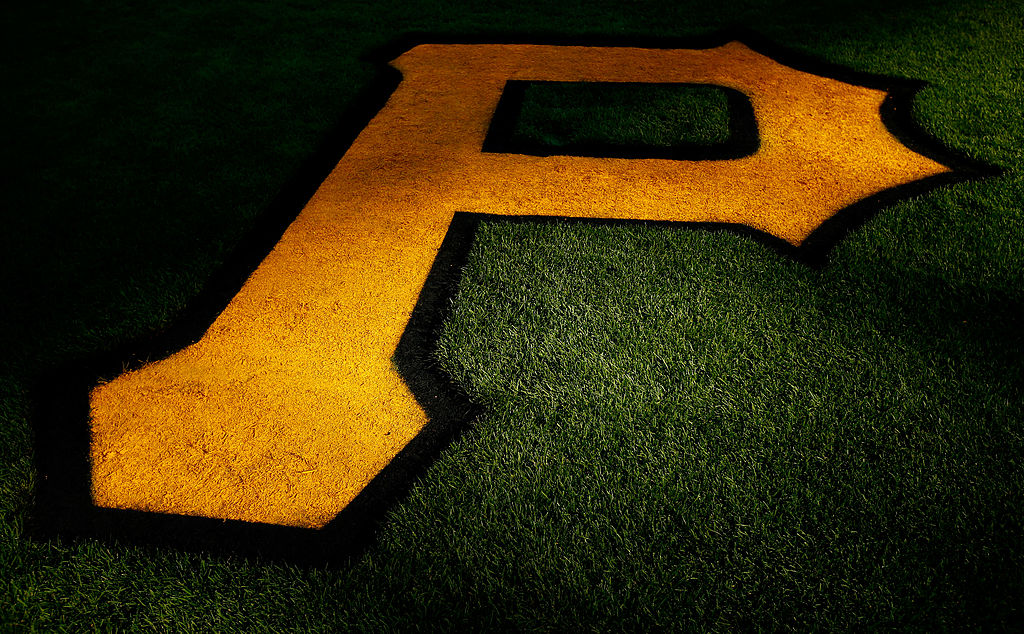
In a time when there were no divisions and the winners of each league made the World Series (which was the only postseason series), the 1960 Pirates pulled off a massive upset over the New York Yankees. Led by eight All-Stars, including NL MVP winner Dick Groat and runner-up Don Hoak (who was not an All-Star), Cy Young Award winner Vern Law, and Hall of Famers Roberto Clemente and Bill Mazeroski, the Pirates won 95 games to the Yankees’ 97 and the series was viewed as the Yankees’ to lose.
The Yankees outscored the Pirates 55-27 across the series, had 10 home runs to the Pirates’ four, outhit the Pirates 91-60, and had two complete game shutouts from Whitey Ford, and they still lost the series in seven games. The Yankees’ three wins in Games 2, 3, and 6, came by scores of 16-3, 10-0, and 12-0, respectively, while the Pirates’ four wins came by scores of 6-4, 3-2, 5-2, and 10-9.
In the pivotal Game 7, the game went back-and-forth with both teams holding leads late, and the game being tied 9-9 going into the bottom of the ninth inning. On the second pitch of the inning, Mazeroski hit a game-winning home run to left field, becoming the only player in MLB history to hit a walk-off home run in Game 7 of the World Series, and one of only two to hit one in a Game 7 in postseason history (Aaron Boone hit one to clinch the 2003 ALCS for the Yankees over the Boston Red Sox).
Game 7 is also remembered for being the only game in MLB postseason history where neither team recorded a single strikeout. World Series MVP went to Yankees second baseman Bobby Richardson, who had 11 hits, 12 RBI, and a .367 batting average in the series; he is the only player in MLB history to win World Series MVP as a losing player.
2019 Washington Nationals
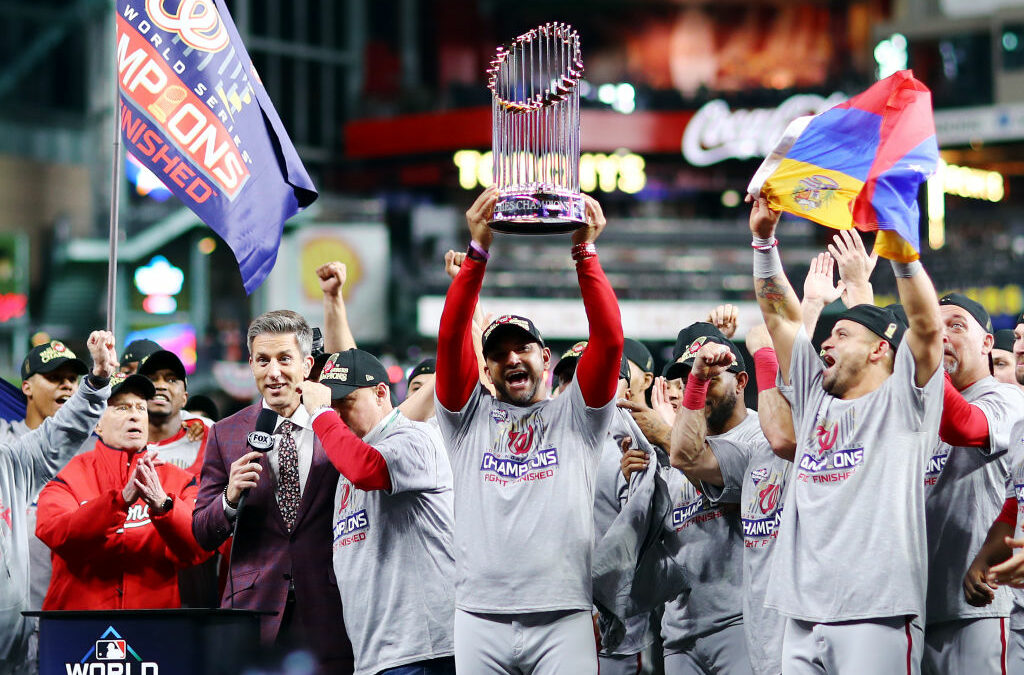
It’s tough for this Nationals fan to admit, but the 2019 Nationals are certainly one of the worst teams to win the World Series. They are similar to the 2021 Braves and 2006 Cardinals in the sense that they had a solid core for many years beforehand, but the fact that the 2019 Nationals are the ones that one it and not one of the earlier teams is somewhat absurd to think about.
The Nationals started the season with a 19-31 record, but after that, the team came alive, going 74-38 for the rest of the season and earning the first Wild Card spot in the process. Led by their two All-Stars, third baseman Anthony Rendon (who was an MVP candidate) and ace Max Scherzer, as well as other important players like starting pitcher Stephen Strasburg, left fielder Juan Soto, starting pitcher Patrick Corbin (who had a career year), center fielder Victor Robles, and shortstop Trea Turner, the Nationals were certainly a decent team but not one who would have been expected to win the World Series.
In the Wild Card Game, the Nationals defeated the Milwaukee Brewers 1-0 to advance to the NLDS, where they defeated the 106-win Los Angeles Dodgers in five games. In the NLCS, the Nationals swept the NL Central champion St. Louis Cardinals, who had won 91 games, to advance to the World Series to face the Houston Astros, who had won 107 games.
In the first World Series where the away team won every game, the Nationals prevailed in seven games to win their first championship as a franchise. World Series MVP went to Stephen Strasburg, who pitched one of the finest World Series in history. Strasburg won both games he started, Games 2 and 6, with a 2.51 ERA in 14.1 total innings, and had an overall record of 5-0 in five starts in the postseason.























